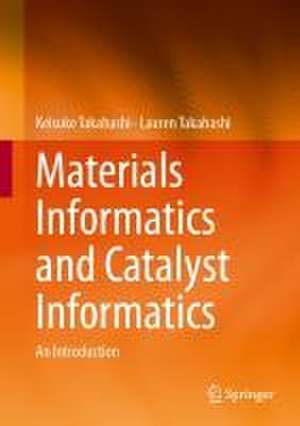Materials Informatics and Catalysts Informatics: An Introduction
Autor Keisuke Takahashi, Lauren Takahashien Limba Engleză Hardback – 31 mar 2024
This textbook is designed for students and researchers who are interested in materials and catalysts informatics with little to no prior experience in data science or programming languages. Starting with a comprehensive overview of the concept and historical context of materials and catalysts informatics, it serves as a guide for establishing a robust materials informatics environment. This essential resource is designed to teach vital skills and techniques required for conducting informatics-driven research, including the intersection of hardware, software, programming, machine learning within the field of data science and informatics.
Readers will explore fundamental programming techniques, with a specific focus on Python, a versatile and widely-used language in the field. The textbook explores various machine learning techniques, equipping learners with the knowledge to harness the power of data science effectively. The textbook provides Python code examples, demonstrating materials informatics applications, and offers a deeper understanding through real-world case studies using materials and catalysts data. This practical exposure ensures readers are fully prepared to embark on their informatics-driven research endeavors upon completing the textbook. Instructors will also find immense value in this resource, as it consolidates the skills and information required for materials informatics into one comprehensive repository. This streamlines the course development process, significantly reducing the time spent on creating course material. Instructors can leverage this solid foundation to craft engaging and informative lecture content, making the teaching process more efficient and effective.
Preț: 792.66 lei
Preț vechi: 966.65 lei
-18% Nou
Puncte Express: 1189
Preț estimativ în valută:
151.68€ • 158.76$ • 126.24£
151.68€ • 158.76$ • 126.24£
Carte disponibilă
Livrare economică 10-24 martie
Preluare comenzi: 021 569.72.76
Specificații
ISBN-13: 9789819702169
ISBN-10: 981970216X
Pagini: 297
Ilustrații: IX, 297 p. 1 illus.
Dimensiuni: 168 x 240 mm
Greutate: 0.75 kg
Ediția:2024
Editura: Springer Nature Singapore
Colecția Springer
Locul publicării:Singapore, Singapore
ISBN-10: 981970216X
Pagini: 297
Ilustrații: IX, 297 p. 1 illus.
Dimensiuni: 168 x 240 mm
Greutate: 0.75 kg
Ediția:2024
Editura: Springer Nature Singapore
Colecția Springer
Locul publicării:Singapore, Singapore
Cuprins
Chapter 1. An Introduction to Materials Informatics and Catalysts Informatics.- Chapter 2. Developing an Informatics Work Environment.- Chapter 3. Programming.- Chapter 4. Programming and Python.- Chapter 5. Data and Materials and Catalysts Informatics.- Chapter 6. Data Visualization.- Chapter 7. Machine Learning.- Chapter 8. Supervised Machine Learning.- Chapter 9. Unsupervised Machine Learning and Beyond Machine Learning.
Notă biografică
Keisuke Takahashi is a full professor at the Department of Chemistry at Hokkaido University in Japan. He has earned a B.S. in Materials Science and Engineering at the University of Arizona, followed by an M.S. at Chalmers University of Technology and a Ph.D. at Hokkaido University. He is the principal investigator of the Information Chemistry group at Hokkaido University where he conducts research in materials and catalyst informatics. His group performs experiment, theory, computation, and data science for designing heterogeneous catalysis, water splitting, artificial photosynthesis, CO2 reduction, perovskite solar cells, and 2-dimensional materials. His research interests are focused on designing catalysts and materials via materials and catalysts informatics.
Lauren Takahashi is an assistant professor at the Department of Chemistry at Hokkaido University in Japan. She is also a member of the Information Chemistry group with Professor Takahashi where she applies ontology and data science towards material design and catalyst-centered research. She has earned a B.A. in Linguistics at the University of Arizona, an M.S. in Communication at the University of Gothenburg, and a Ph.D. in Chemical Systems Engineering at The University of Tokyo. Her research interests focus on improving the structure, usability, and semantics of materials and catalyst data through tactical applications of ontology, data science, machine learning, graph theory, and information science, with the aim of improving the materials and catalysts design process. Textul de pe ultima copertă
This textbook is designed for students and researchers who are interested in materials and catalysts informatics with little to no prior experience in data science or programming languages. Starting with a comprehensive overview of the concept and historical context of materials and catalysts informatics, it serves as a guide for establishing a robust materials informatics environment. This essential resource is designed to teach vital skills and techniques required for conducting informatics-driven research, including the intersection of hardware, software, programming, machine learning within the field of data science and informatics.
Readers will explore fundamental programming techniques, with a specific focus on Python, a versatile and widely-used language in the field. The textbook explores various machine learning techniques, equipping learners with the knowledge to harness the power of data science effectively. The textbook provides Python code examples, demonstrating materials informatics applications, and offers a deeper understanding through real-world case studies using materials and catalysts data. This practical exposure ensures readers are fully prepared to embark on their informatics-driven research endeavors upon completing the textbook.
Instructors will also find immense value in this resource, as it consolidates the skills and information required for materials informatics into one comprehensive repository. This streamlines the course development process, significantly reducing the time spent on creating course material. Instructors can leverage this solid foundation to craft engaging and informative lecture content, making the teaching process more efficient and effective.
Caracteristici
Designed for true beginners in regards to data science or programming languages Guides students towards setting up a functional materials informatics environment Includes case studies using real materials and catalysts data and scenarios
